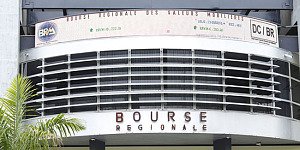Almost everywhere you look in Africa, stock markets are soaring with some hitting unprecedented levels. Egyptian equities, as measured by the EGX 30 index, climbed another 0.45% in the week ending July 10. The benchmark index has surged over 13% since the start of the year in local currency terms - an impressive rally by any measure. But for international investors eyeing their returns in US dollars, the picture is far less rosy.
The Egyptian pound's steep decline against the greenback had turned those double-digit gains into a painful -26% loss. This mirrors the paradox facing many African equity markets in 2024. While local stock indices post enviable gains, weak currencies in markets like Egypt, Nigeria, Zimbabwe and others are eroding returns for international investors and those measuring performance in US dollars or euros, dimming the continent's appeal as a frontier market destination.
Last month, one of the world’s largest asset managers BlackRock said it was liquidating its $400 million iShares ETF which had investments in countries like Nigeria and Kenya, citing tough economic conditions and currency issues. The liquidation points to broader systemic challenges in these markets: currency volatility has made it increasingly difficult for foreign investors to maintain stable returns, alongside market liquidity challenges and restrictions on the repatriation of profits.
This development may prompt a reassessment of risk-reward profiles for African equities among global investors, potentially leading to a reduced inflow of foreign capital into these markets in the near term.
Egypt’s Costly Reforms
Egypt's story is particularly striking. The dramatic divergence between equity returns in local and foreign currency terms stems from Egypt's recent currency crisis.
In March 2024, the country implemented economic reforms, including a sharp devaluation of the Egyptian pound. The central bank hiked interest rates by 600 basis points and allowed the pound's value to plummet against the US dollar.
These measures were part of an $8 billion rescue package deal with the International Monetary Fund (IMF), expanded from a previous $3 billion agreement. The reforms aim to address the North African nation’s chronic foreign currency shortage and rampant inflation, which saw unsubsidized bread prices nearly double in just one year.
While the devaluation may help make Egyptian exports more competitive and improve the country's trade deficit, it has significantly diminished the purchasing power of Egyptians, nearly 30% of whom already live in poverty. For international investors, the currency's decline has more than offset any stock market gains.
Nigeria’s Naira Woes Overshadow Market Rally
Nigeria presents a similar picture. The NGX All Share Index has soared 33.3% in naira terms since the start of 2024. Yet, when measured in US dollars, investors are looking at a -24.46% loss.
The culprit? The Nigerian naira's dismal performance. Bloomberg reported that the naira ended the first half of 2024 as the world's worst-performing currency, weakening by 40% since the start of the year. This losing streak is the longest since July 2017 for one of Africa's largest economies.
Nigeria has grappled with acute foreign exchange scarcity and instability for years, primarily due to lower crude oil production and a lack of economic diversification. Since June 2023, when President Bola Tinubu's government introduced policy changes to attract inflows and revive the economy, the local currency has lost about 70% of its value against the dollar.
Central Bank Governor Olayemi Cardoso has expressed optimism that the currency's volatility may be subsiding. Since taking office in September, he has increased interest rates by 750 basis points to 26.25%, cleared a foreign exchange backlog, and negotiated multilateral dollar inflows to help stabilize the currency. However, the naira's performance in the first half of 2024 suggests that significant challenges remain.
Extreme Currency Volatility in Zimbabwe
Zimbabwe's situation is perhaps the most extreme. The Zimbabwe Stock Exchange (ZSE) All Share Index has plummeted 99.92% in local currency terms year-to-date. When converted to US dollars, this translates to a 62.95% loss.
This decline comes as Zimbabwe recently announced the conversion of its domestic dollar balances into a new currency called Zimbabwe Gold, or ZiG. This move represents yet another attempt to stabilize the country's volatile currency situation, which has seen multiple redenominations and periods of hyperinflation over the past two decades.
The new ZiG currency is supposedly backed by gold reserves, with the central bank governor claiming 1.1 tons of gold in its vaults and additional reserves abroad. However, economists and citizens remain skeptical, given the country's history of failed currency reforms.
Despite the introduction of ZiG, around 85% of all transactions in Zimbabwe are still conducted in US dollars, highlighting the ongoing lack of confidence in the domestic currency. This persistent dollarization makes it challenging for the stock market to function effectively in local currency terms.

The BRVM Advantage
In stark contrast to the currency-driven losses seen in some African markets, the BRVM, a regional stock exchange serving eight West African countries, is delivering solid returns in both local and foreign currency terms.
The BRVM Composite index, which covers stocks listed on the Bourse Régionale des Valeurs Mobilières headquartered in Abidjan, Côte d'Ivoire, has risen 8.18% in local currency terms through July 12th. More importantly for international investors, those gains translate to a 6.74% return in US dollars and a 7.97% return in euros.
An ability to preserve returns for foreign investors stems from the currency used in its member countries. The exchange operates using the CFA franc, which is pegged to the euro at a fixed rate. This peg provides a level of stability and predictability that's sorely lacking in many other African currencies.
The eight countries served by the BRVM - Benin, Burkina Faso, Côte d'Ivoire, Guinea-Bissau, Mali, Niger, Senegal, and Togo - are all members of the West African Economic and Monetary Union (WAEMU). This economic bloc uses the West African CFA franc, which has maintained its peg to the euro since 1999.
While the returns are more modest than in some other African markets, the minimal gap between local and foreign currency returns demonstrates the value of currency stability. The slight difference is due to fluctuations in the euro-dollar exchange rate rather than weakness in the CFA franc itself. The euro’s movements have also been far less dramatic than the devaluations seen in countries like Egypt and Nigeria.
This stability makes the BRVM an attractive option for risk-averse investors looking to gain exposure to African equities without taking on significant currency risk. It allows investors to focus more on company fundamentals and economic factors rather than currency risk and also provides a more predictable environment for the listed companies.
However, the CFA franc peg is not without controversy. Critics argue it limits monetary policy flexibility and keeps the member countries too dependent on France. Nonetheless, for investors seeking a middle ground between high-growth, high-risk markets and the stability of developed economies, the BRVM offers a compelling alternative.

The Bigger Picture
Despite the currency challenges, many African stock markets have shown impressive performance in local currency terms in 2024.
Of noteworthy mention is Kenya‘s stock benchmark, which swung from rock bottom earlier in the year to being one of the world’s best performers. The Nairobi Securities Exchange All-Share Index has returned over 45% for dollar investors this year, following a loss of more than 40% in 2023.
These figures underscore the potential of African equity markets, particularly for local investors or those able to hedge currency risk effectively. However, the stark difference between local currency returns and US dollar returns in many markets highlights the critical role that currency stability plays in attracting and retaining international investment.

Balancing Growth and Stability
The divergent fortunes of African stock markets in 2024 underscore the complex challenges facing the continent's economies. While many countries are seeing robust economic growth and booming local stock markets, currency instability threatens to undermine these gains in the eyes of international investors.
For countries like Egypt and Nigeria, the path forward involves carefully balancing the need for competitive exchange rates with the desire for currency stability. Both nations are working with international partners like the IMF to implement reforms, but the process is likely to be gradual and potentially volatile.
Zimbabwe's situation remains particularly challenging, given its history of hyperinflation and multiple currency crises. The introduction of the ZiG currency represents yet another attempt to stabilize the monetary system, but it remains to be seen whether this effort will succeed where others have failed.
The relative success of the BRVM and the CFA franc zone offers an intriguing model for other African regions to consider. While full currency unions may not be feasible or desirable for all countries, exploring ways to enhance monetary cooperation and reduce exchange rate volatility could help preserve stock market gains for both local and international investors.
For investors, the key takeaway is the increasing importance of looking beyond headline stock market returns when evaluating African investment opportunities. Currency trends, economic reforms, and political stability are crucial factors to consider alongside equity performance. While the potential for high returns exists, as evidenced by the strong local currency performance of many markets, managing currency exposure is crucial to realizing gains in real terms.
As Africa continues to develop and its financial markets mature, addressing currency stability will be key to unlocking the full potential of the continent's stock markets. Until then, investors will need to navigate carefully, balancing the exciting opportunities presented by Africa's growth story with the very real risks posed by currency volatility.
This article was contributed by Michael Ajifowoke, Insights Associate at Daba Finance.









































